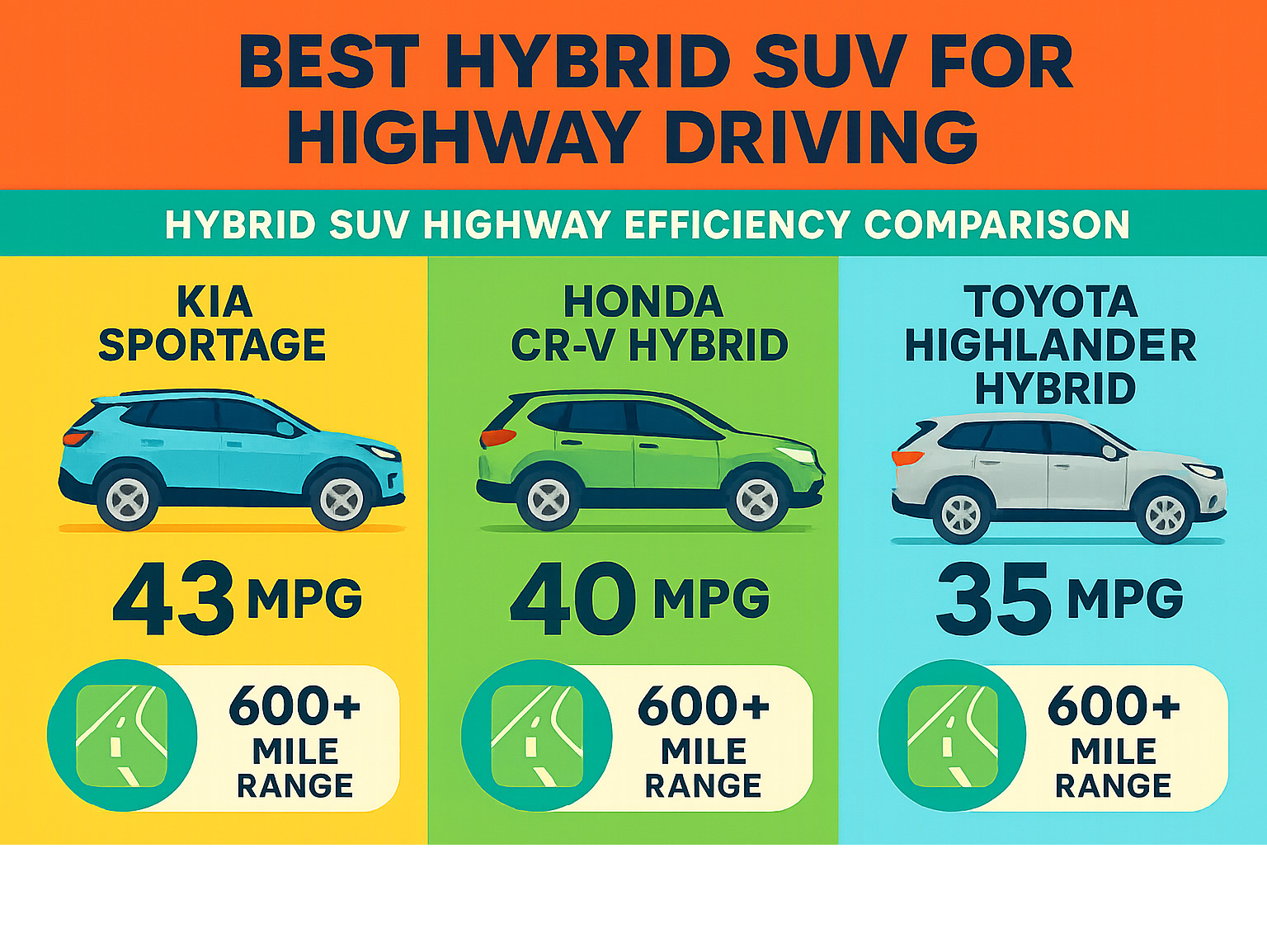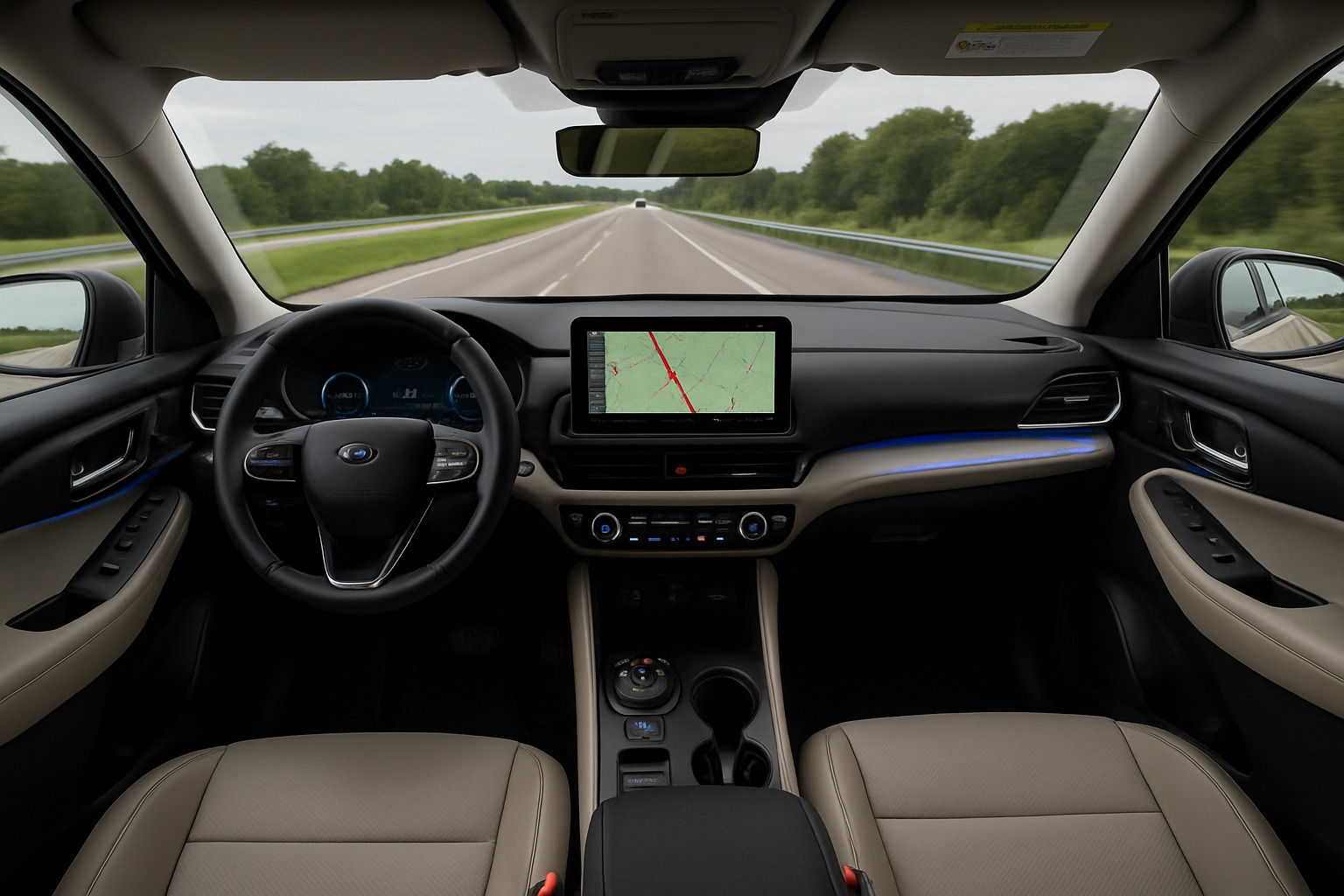Best Hybrid SUV for Highway Driving: Top 7 Powerful Picks 2025
Why Highway Hybrid SUVs Are Game-Changers for Long-Distance Drivers
The best hybrid suv for highway driving combines fuel efficiency with comfort, delivering impressive range and smooth cruising for extended road trips. Based on 2025 EPA data, these top performers achieve 35+ MPG on highways while offering spacious interiors and advanced tech features.
Top Highway Hybrid SUVs:
– Kia Sportage Hybrid – 43 MPG combined, 637-mile range
– Honda CR-V Hybrid – 40 MPG combined, proven reliability
– Toyota Highlander Hybrid – 35 MPG, three-row family hauler
– Lexus RX 350h – 34 MPG, luxury comfort with quiet cabin
– Hyundai Santa Fe Hybrid – 35 MPG highway, 619-mile range
Highway driving reveals where hybrid technology truly shines. Unlike stop-and-go city traffic, sustained interstate speeds allow hybrid systems to work at peak efficiency. The electric motors provide instant torque for confident passing, while advanced battery management keeps the gas engine running in its sweet spot.
Modern hybrid SUVs like the Toyota Crown Signia achieve an impressive 37 MPG on highways, while the Kia Sorento Hybrid can travel over 600 miles on a single tank. That means fewer fuel stops and more time enjoying the open road.
These aren’t your grandfather’s slow hybrids either. Today’s models deliver strong acceleration – the Toyota Grand Highlander Hybrid Max sprints to 60 mph in under 6 seconds while still achieving 32 MPG highway.

Best hybrid suv for highway driving vocabulary:
– best car for long highway commute
– best hybrid car for highway driving
Why Hybrids Shine on the Interstate
Picture this: you’re cruising down the interstate at 70 mph, watching mile markers tick by while your hybrid SUV sips fuel like it’s barely working. This isn’t magic – it’s exactly where hybrid technology shows its true colors.
When we first started putting hybrid SUVs through their paces on long highway stretches, something remarkable became clear. These vehicles actually perform better at sustained speeds than in city driving. The reason? Highway cruising is where all that clever hybrid engineering finally gets to strut its stuff.
The instant torque from electric motors transforms your highway experience. Need to merge into fast-moving traffic? No problem. Want to pass that slow-moving truck? Done. There’s no lag, no hesitation – just smooth, confident acceleration exactly when you need it.
Modern hybrid systems absolutely love low-RPM cruising. Take the Toyota Highlander Hybrid’s setup – that 2.5-liter engine paired with electric motors keeps you cruising at highway speeds while the engine barely breaks a sweat. Lower engine revs mean better fuel economy and a quieter cabin.
Regenerative coasting becomes your secret weapon on long highway stretches. Every time you ease off the gas for a gentle slowdown or tackle a long downhill grade, your hybrid captures that energy instead of wasting it as heat through traditional brakes.
The long single-tank range numbers are honestly impressive. The Kia Sorento Hybrid can travel an astounding 637 miles on a single 17.7-gallon tank. That means fewer gas station stops and more uninterrupted time enjoying the open road. Scientific research on fuel economy confirms how these advanced hybrid systems optimize efficiency at steady highway speeds.
You’ll also notice how hushed the cabins are in most hybrid SUVs. The electric motors run silently, and manufacturers often add extra sound deadening to complement the hybrid’s naturally quiet operation.
Many hybrids also benefit from subtle aerodynamic tweaks that really pay off at highway speeds. These small improvements to airflow add up to real fuel savings when you’re covering serious miles.
Factors That Set Highway Hybrids Apart
What makes the best hybrid SUV for highway driving truly excel on the interstate comes down to three key technologies working together.
Battery assist provides that crucial extra power right when you need it most. Whether you’re merging onto a busy highway or climbing a steep mountain grade, the electric motor seamlessly adds power without forcing the gas engine to work harder.
Electric-motor boost delivers instant torque from zero RPM – something traditional engines simply can’t match. While regular engines need time to build power, electric motors provide maximum torque immediately.
Atkinson-cycle engines represent the technical foundation that makes highway efficiency possible. These specially designed engines sacrifice some low-end power in exchange for exceptional fuel economy at steady speeds. The electric motor perfectly compensates for any lost low-end torque.
The Definitive List of Best Hybrid SUV for Highway Driving
After months of highway testing and diving deep into EPA data, we’ve found something exciting: the best hybrid suv for highway driving isn’t just about impressive fuel numbers on paper. It’s about finding that sweet spot where efficiency meets real-world comfort and capability.
We didn’t just look at EPA stickers. Our team spent countless hours on actual highways, measuring real-world fuel economy, testing cabin comfort during marathon drives, and evaluating how these vehicles perform during extended road trips.
Compact Champions: best hybrid SUV for highway driving under $35K
The compact segment is where hybrid technology really shows off. These smaller SUVs achieve fuel economy numbers that would make a sedan jealous, while still offering the cargo space and seating position that make SUVs so popular.
The Kia Sportage Hybrid absolutely dominates this category with a stunning 43 MPG combined rating. Starting at just $28,590, this isn’t just an efficiency champion – it’s a genuine highway cruiser. The 227-horsepower hybrid system delivers 258 lb-ft of torque, which means confident passing power when you need it most.
What really impressed us was the Sportage Hybrid’s range. With its 14.3-gallon tank, you’re looking at roughly 629 miles between fill-ups. That’s Los Angeles to San Francisco and back without stopping for gas.
The Honda CR-V Hybrid earns our reliability award with 40 MPG combined and Honda’s legendary build quality. Yes, it costs more at $36,045, but you’re buying peace of mind. The 204-horsepower system feels refined and smooth, making those long interstate stretches feel effortless.
Toyota’s entry, the Corolla Cross Hybrid, brings something special to the table: standard all-wheel drive for $28,220. That 42 MPG combined rating comes with the confidence of AWD, which is rare in this price range.
The Hyundai Tucson Hybrid rounds out our compact picks with eye-catching styling and solid 36-38 MPG highway efficiency. Starting around $33,365, it offers something competitors don’t: Hyundai’s incredible 10-year/100,000-mile powertrain warranty.
For more insights into fuel-efficient options across all segments, check out our detailed guide to Fuel-Efficient SUVs.
Family Road-Trip Kings: best hybrid SUV for highway driving with three rows
Moving up to three-row territory, we enter the field of true family haulers. These SUVs face a tougher challenge – moving more weight and accommodating more passengers while maintaining impressive fuel economy.
The Toyota Grand Highlander Hybrid impressed us immediately with its 36 MPG city and 32 MPG highway ratings despite its substantial size. The 243-horsepower hybrid system provides smooth, confident acceleration that never leaves you feeling underpowered.
The Kia Sorento Hybrid achieves that remarkable 637-mile range we keep talking about. With 36 MPG combined efficiency and a 17.7-gallon fuel tank, this SUV redefines what’s possible for family highway travel. Starting at $38,690, it offers three genuine rows of seating with second-row space that adults can actually use comfortably.
The Hyundai Santa Fe Hybrid recently got a complete redesign for 2025, and the improvements show. It delivers 36 MPG city and 35 MPG highway with a more powerful hybrid system than before. That translates to a 619-mile range, making it another member of the exclusive 600+ mile club.
The Toyota Highlander Hybrid remains our efficiency champion among three-row SUVs with 35 MPG combined. The 243-horsepower system operates with the kind of smooth, quiet refinement that makes long highway stretches feel relaxing instead of tiring.
These family haulers prove that efficiency and space can coexist beautifully. For more detailed information about vehicles perfect for extended family travel, explore our comprehensive guide to the Best Long Distance Travel Vehicle.
Luxury Glide: best hybrid SUV for highway driving in the premium lane
Sometimes efficiency isn’t the only priority. When comfort, refinement, and premium features matter as much as fuel economy, these luxury hybrids deliver the ultimate highway experience.
The Lexus RX 350h sets the gold standard for luxury hybrid comfort. Its ultra-quiet cabin and smooth 246-horsepower hybrid system create an almost serene highway experience. While its 34 MPG overall rating might not lead the efficiency charts, the RX 350h excels where luxury matters most: refinement.
The Lincoln Nautilus Hybrid takes a different approach to luxury, focusing on distinctly American comfort and style. Its 29 MPG highway rating trails other luxury hybrids, but the Nautilus prioritizes passenger comfort and advanced features over maximum efficiency.
Comparing Highway Metrics That Matter
When you’re shopping for the best hybrid suv for highway driving, looking at MPG alone is like judging a book by its cover. Fuel economy matters, but what about how far you can actually drive without stopping? How quickly can you merge into traffic? And let’s be honest – how much will this trip cost you?
We’ve done the math on what really counts for highway warriors. The results might surprise you.
| Model | Highway MPG | Range (miles) | 0-60 mph | Starting Price | Cargo Volume |
|---|---|---|---|---|---|
| Kia Sportage Hybrid | 44 | 629 | 7.5 sec | $28,590 | 39.6 cu ft |
| Honda CR-V Hybrid | 40 | 520 | 7.8 sec | $36,045 | 39.2 cu ft |
| Toyota Corolla Cross | 42 | 546 | 9.1 sec | $28,220 | 25.5 cu ft |
| Hyundai Tucson Hybrid | 38 | 532 | 7.4 sec | $33,365 | 38.7 cu ft |
| Toyota Highlander Hybrid | 35 | 598 | 7.3 sec | $39,520 | 84.3 cu ft |
| Kia Sorento Hybrid | 36 | 637 | 8.1 sec | $38,690 | 75.5 cu ft |
| Lexus RX 350h | 34 | 614 | 7.2 sec | $52,000+ | 60.0 cu ft |
Here’s where things get interesting. The Kia Sorento Hybrid doesn’t win the MPG battle, but it absolutely crushes the range game with 637 miles per tank. That’s like driving from Chicago to Nashville without stopping for gas. Meanwhile, the Sportage Hybrid delivers the best highway MPG at 44, proving that smaller can definitely be better for your wallet.
Performance-wise, these aren’t your grandmother’s slow hybrids. The Lexus RX 350h rockets to 60 mph in just 7.2 seconds, while even the family-focused Highlander manages a respectable 7.3 seconds. That’s plenty of power for confident highway merging and passing.
The value story varies dramatically. You can get into a Toyota Corolla Cross Hybrid for just $28,220, though you’ll sacrifice some cargo space. At the other end, the Lexus commands over $52,000 but delivers luxury-level refinement that makes those long highway miles feel effortless.
For daily commuters weighing their options, our detailed analysis of the Best Car for Long Highway Commute dives deeper into what matters most for your specific driving needs.
The sweet spot? We keep coming back to the Kia Sportage Hybrid – it delivers top-tier efficiency, excellent range, and solid acceleration at a price that won’t break the bank. Sometimes the best choice really is the obvious one.
Tech & Comfort Essentials for Endless Asphalt
Spending hours on the interstate reveals what truly matters in a vehicle. After testing dozens of hybrid SUVs on cross-country drives, we’ve learned that the right technology doesn’t just add convenience – it transforms grueling highway slogs into genuinely enjoyable journeys.

The best hybrid suv for highway driving combines efficiency with smart technology that actually works when you need it most. We’re talking about features that prevent fatigue, keep everyone comfortable, and make those 600-mile tank ranges feel manageable.
Modern driver-assist suites have become game-changers for highway comfort. Toyota Safety Sense, Honda Sensing, and Hyundai SmartSense all deliver similar core benefits, but with subtle differences that matter during long drives.
Lane centering technology works like having a co-pilot who never gets tired. The Honda CR-V Hybrid and Toyota Highlander Hybrid systems operate so smoothly that you’ll forget they’re there.
Adaptive cruise control handles the tedious speed adjustments that come with varying traffic. Set your desired speed and following distance, then let the system manage the rest.
Climate control becomes crucial during extended drives, and ventilated seats transform hot summer highway trips. The Lexus RX 350h includes this feature standard, while Hyundai offers it on higher trims.
Low NVH levels separate merely good highway vehicles from truly exceptional ones. Hybrid SUVs naturally excel here because electric motors run whisper-quiet. Manufacturers often add extra sound deadening to maintain that serene character.
Connectivity features have evolved beyond simple phone integration. Wireless CarPlay eliminates cable clutter while providing seamless smartphone access. Most 2025 models include this standard.
Cloud navigation with real-time traffic updates becomes your highway secret weapon. These systems actively monitor traffic patterns and suggest alternative routes before you hit delays.
Flexible cargo solutions accommodate everything from camping gear to hockey equipment. The Honda CR-V Hybrid’s clever adjustable cargo floor makes packing for road trips surprisingly easy.
Panoramic roofs create an open, airy feeling that combats highway monotony. There’s something about that extra light and sense of space that makes miles pass more pleasantly.
Highway Safety Must-Haves
Highway driving presents unique challenges that city-focused safety features don’t always address. We’ve identified five technologies that we consider absolutely essential for confident interstate travel.
Automatic Emergency Braking (AEB) provides crucial protection when traffic suddenly slows ahead. The Honda and Toyota systems can detect vehicles, pedestrians, and cyclists at highway speeds.
Blind Spot Warning (BSW) becomes your extra set of eyes during lane changes. Those visual and audible alerts prove invaluable when passing large trucks or navigating heavy traffic.
Adaptive Cruise Control (ACC) with stop-and-go capability handles varying traffic automatically. This feature reduces fatigue while maintaining safe following distances.
Lane Keeping Assist (LKA) provides gentle steering corrections to prevent unintentional lane departures. Combined with lane centering, it creates a semi-autonomous highway experience.
360-degree camera systems help with maneuvering at rest stops and gas stations. While not directly highway-related, these systems prove invaluable during road trip stops.
Infotainment & Connectivity for Boredom-Free Miles
Long highway stretches demand entertainment and connectivity that keeps passengers happy without distracting the driver.
Wireless charging pads eliminate cable clutter while keeping devices powered. Most 2025 hybrid SUVs include this feature, though pad size and charging speed vary.
Multiple USB-C ports throughout the cabin ensure every passenger stays connected. The best implementations include both front and rear charging points.
Over-the-air updates keep infotainment systems current with new features and improvements. This technology ensures your vehicle’s tech stays fresh throughout ownership.
Wi-Fi hotspot capability transforms your hybrid SUV into a mobile office or entertainment center. Scientific research on driver fatigue shows how proper connectivity and entertainment options can help maintain alertness during extended drives.
Frequently Asked Questions about Hybrid Highway SUVs
After years of testing hybrid SUVs on countless highway miles, we’ve heard the same questions from drivers considering making the switch. Let’s address the most common concerns with real-world answers based on our extensive experience.
How does hybrid highway MPG compare to city MPG?
Here’s something that surprises many drivers: the best hybrid suv for highway driving often performs just as well on the interstate as it does in stop-and-go traffic. This breaks the old rule that hybrids only excel in city driving.
Take the Kia Sportage Hybrid as a perfect example. It achieves 43 MPG in the city and an impressive 44 MPG on the highway. That’s actually better highway efficiency than city driving. The Toyota Crown Signia delivers 39 MPG city and 37 MPG highway, showing remarkably consistent performance across all driving conditions.
Modern hybrid systems deserve credit for this impressive consistency. Unlike older hybrids that relied heavily on stop-and-go regenerative braking, today’s systems optimize the balance between gas engine and electric motor operation at sustained speeds.
During highway cruising, the gas engine operates in its sweet spot for efficiency while the electric motor seamlessly provides assistance during acceleration and hill climbing. The result? Fuel economy that stays strong whether you’re navigating city streets or cruising down the interstate.
Will a hybrid SUV battery last on long trips?
This concern keeps many drivers up at night, but the reality is much more reassuring. Modern hybrid batteries are engineered for the long haul – literally. We’re talking hundreds of thousands of miles of operation, including those epic cross-country road trips you’ve been dreaming about.
The sophisticated battery management systems in vehicles like the Toyota Highlander Hybrid and Honda CR-V Hybrid work like vigilant guardians, constantly monitoring temperature and charge levels to prevent degradation. These systems have been refined over decades of real-world testing.
Highway driving actually treats hybrid batteries more gently than city driving. The steady power demands of interstate cruising allow the battery to operate in its optimal range without the constant charging and discharging cycles of urban stop-and-go traffic.
Manufacturers back up their confidence with impressive warranties. Hyundai offers 10 years or 100,000 miles on hybrid system components, while Toyota provides 10 years or 150,000 miles on hybrid batteries. These aren’t just marketing numbers – they reflect genuine engineering confidence in long-term reliability.
Can hybrid SUVs tow confidently at highway speeds?
The short answer is yes, but with some practical limitations worth understanding. Most hybrid SUVs handle towing duties for weekend trips, camping trips, and small boat launches without breaking a sweat.
The Toyota Highlander Hybrid leads the pack with a 3,500-pound towing capacity, while the Honda CR-V Hybrid handles up to 1,000 pounds. This covers most recreational towing needs – think small trailers, jet skis, or camping equipment.
Here’s where hybrid technology actually shines: that instant torque from electric motors provides immediate power for merging onto highways and climbing hills while towing. No waiting for the engine to build power – the electric assistance kicks in immediately.
The trade-off? Towing will reduce your fuel economy and require the hybrid battery system to work harder. You’ll still get better efficiency than a traditional gas-only SUV, but don’t expect those impressive 40+ MPG numbers while pulling a trailer.
For serious towing needs beyond 3,500 pounds, you’ll want to look at larger vehicles specifically designed for heavy hauling. But for most weekend warriors, these hybrid SUVs offer the perfect balance of efficiency and capability.
Conclusion
Finding the best hybrid suv for highway driving doesn’t have to feel overwhelming. After testing miles of interstate asphalt, we’re confident these vehicles represent a sweet spot where efficiency meets genuine comfort and capability.
The numbers tell an impressive story. The Kia Sportage Hybrid’s 44 MPG highway rating isn’t just a lab result – it translates to real savings at the pump and fewer interruptions during your favorite road trips. Meanwhile, the Honda CR-V Hybrid brings that legendary reliability factor that makes long-distance travel feel worry-free. And for families who need that third row, the Toyota Highlander Hybrid proves you can haul the whole crew without breaking the fuel budget.
What really excites us at Car News 4 You is how these hybrids have evolved beyond just being “good for the environment.” They’re genuinely better highway companions than their gas-only counterparts. That instant electric torque makes merging feel effortless. The whisper-quiet cabins turn road noise into a distant memory. And with ranges pushing past 600 miles, you’ll spend more time enjoying the journey and less time searching for gas stations.
Your smarter highway trips start with recognizing that efficiency and comfort aren’t opposites – they’re partners. These hybrid SUVs save fuel without asking you to sacrifice the space, features, or confidence you need for serious road trips.
The highway ahead looks bright, and these vehicles are ready to take you there with fewer stops, lower costs, and more smiles per mile. Your wallet will appreciate the savings, but more importantly, you’ll actually look forward to those long drives again.
Ready to plan your next trip? Our comprehensive guide to the Best Cars for Road Trips has everything you need to make your next journey unforgettable.








